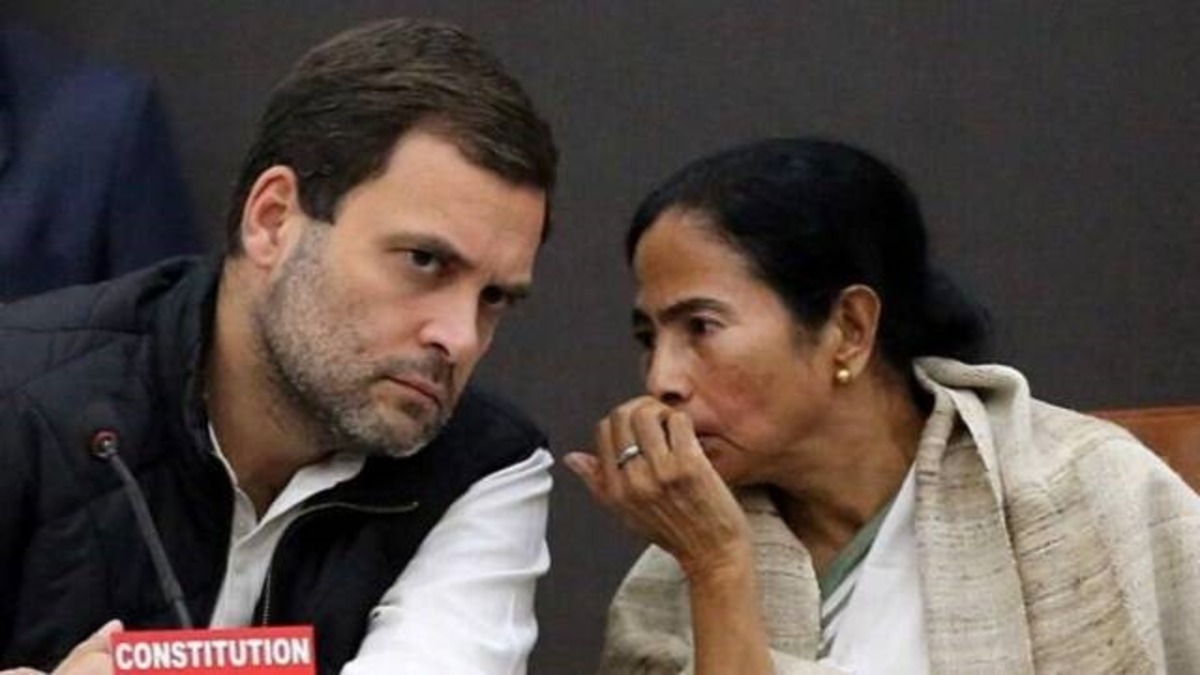The Congress is furious at Mamata Banerjee’s concerted effort to ensure that Rahul Gandhi is not declared “the big boss’’ in the still-in-the works opposition alliance. Congress’s Adhir Ranjan Chowdhury insinuated Banerjee was playing the BJP’s game out of fear of investigative agencies.
The Congress’s recent win in the Muslim-dominated Sagardighi Assembly bypoll, a TMC stronghold, with the help of the CPM, has further antagonised Banerjee. Akhilesh Yadav has been persuaded to stay equidistant from both the Congress and the BJP.
Written by Coomi Kapoor
March 26, 2023 07:45 IST
The Congress is furious at Mamata Banerjee’s concerted effort to ensure that Rahul Gandhi is not declared “the big boss’’ in the still-in-the works opposition alliance. Congress’s Adhir Ranjan Chowdhury insinuated that Banerjee was playing the BJP’s game out of fear of investigative agencies. TMC supporters deny the insinuation, pointing out that central investigative agencies are still harassing her nephew Abhishek and his associates. Banerjee’s anti-Rahul stance is ascribed to her poor opinion of his capabilities, even though she has great respect for Sonia Gandhi. If Rahul is made the main challenger to Modi, she fears he would handicap the entire opposition and has informed her party that this is the reason the BJP keeps promoting Rahul’s name.
The Congress’s recent win in the Muslim-dominated Sagardighi Assembly bypoll, a TMC stronghold, with the help of the CPM, has further antagonised Banerjee. Akhilesh Yadav has been persuaded to stay equidistant from both the Congress and the BJP. Banerjee also hopes to win Naveen Patnaik over to her side. Telangana’s K Chandrasekhar Rao, who has prime ministerial ambitions himself, needs no convincing. The NCP skipped the Opposition march to the ED office to protest lack of action against industrialist Adani. Pawar is an old friend of Adani and has stayed with him in Ahmedabad. Ironically, the AAP, which earlier saw the Congress as a direct threat, has now indicated willingness to cooperate in some states.
No norms selections
External Affairs Minister S Jaishankar’s angst in a recent interview to ANI recalling that his father, Dr K Subrahmanyam, unquestionably an outstanding officer, was superseded in 1980 during Rajiv Gandhi’s regime is understandable. But raking up the word “supersession’’ is ironical considering Jaishankar too inhabits a glass house. He was appointed Foreign Secretary in January 2015, just days before retirement. To make his appointment possible, then Foreign Secretary Sujatha Singh was asked to put in her papers, though she still had some months of service left.
In the early years of independence, there were clear guidelines on selections to the top posts in the bureaucracy to ensure that the administration could be insulated from political pulls and pressures. Appointments were made on the basis of seniority of batches and the tenure was generally fixed for two years. But in recent times, seniority and fixed tenures have become an exception rather than the rule. The practice began long before Modi’s regime. For instance, when Shyam Saran was appointed foreign secretary in 2004, the 1970 batch officer jumped over three senior batches and some 15 potential IFS aspirants. In 2006, Shiv Shankar Menon leapfrogged over two senior batches and at least 16 senior colleagues. Since K M Chandrashekhar’s appointment as cabinet secretary in 2007, all cabinet secretaries, Ajit Kumar Seth, Pradip Kumar Sinha and incumbent Rajiv Gauba have had four-year tenures, dashing the hopes of many qualified secretaries to obtain the top job. While a government has the right to pick an officer of its choice for important posts, the dangers of following no clear cut norms is that pliable officers out to please political masters usually hold an edge. Another unfortunate trend is that the cabinet secretary is no longer the most powerful bureaucrat in the country; the senior secretaries in the PMO often carry more weight than the cabinet secretary. Last year, the government passed an ordinance extending the directorships of CBI and ED by an additional three years following a two-year tenure. The ordinance seems to have been specifically tailored to benefit Sanjay Mishra, an IRS officer who heads the ED and is on his third extension. Mishra will complete five years in his post.
Too high profile
Members of all parties are learning the hard way that their respective high commands do not like them to carve out too high-profile a role for themselves. Mohua Moitra the TMC’s articulate, firebrand leader, who regularly takes on the BJP, including PM Modi, has reportedly been told to tone down her rhetoric on the Adani case. Recently, Moitra had questioned the veracity of the electoral affidavits of BJP MP Nishikant Dubey about his age and educational qualifications. Dubey, in retaliation, used the social media to try and score points with low grade innuendos. The BJP has asked both Dubey and the BJP’s Tamil Nadu president K Annamalai not to make statements unilaterally. Annamalai threatened to quit as state party chief if the alliance with the AIADMK remained intact and announced that two central ministers from Tamil Nadu would contest the Lok Sabha elections from the state on a BJP ticket. The party has no intention of fielding Nirmala Sitharaman and S Jaishankar from Tamil Nadu, a state where the BJP has still to strike deep roots. Annamalai is likely to lose his post as state president after the Karnataka polls.
© The Indian Express (P) Ltd
